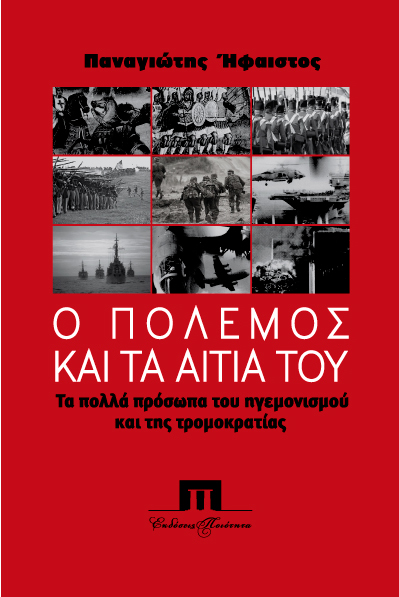Τα μέσα μαζικής καταστροφής είναι το πρόβλημα του μέλλοντος. Ήταν το πρόβλημα του Ψυχρού πολέμου αλλά η αποφυγή πολέμου στηρίχθηκε στο MAD. Λέξει που σημαίνει τρέλα ή τρελός αλλά που στην αγγλική είναι Mutual Assured Destruction. Η μετάφρασή του από τους ειδικούς της στρατηγικής θεωρίας είναι: Απειλή αμοιβαίας αυτοκτονίας εάν ο ένας από τους δύο αντιπάλους του Ψυχρού πολέμου επιτεθεί πρώτος. Το 1979 μια έκθεση του Ινστιτούτου της Μασαχουσέτης, εν τούτοις, κατέδειξε ότι ακόμη και ένα μικρό κλάσμα πυρηνικών κεφαλών να εκραγεί, θα έχουμε «πυρηνικό χειμώνα». Δηλαδή κάλυψη του πλανήτη από καπνό και σκόνες που θα προκαλέσουν πυρκαγιές και η αλλαγή των κλιματικών συνθηκών και τερματισμός του επίγειου βίου όπως τον γνωρίζουμε μετά την βαρβαρότητα. Μάλιστα, τότε γυρίστηκαν και πολλά κινηματογραφικά έργα που απεικόνιζαν τα πορίσματα αυτής της έρευνας, δηλαδή την επιστροφή στην «εποχή των πιθήκων», όπως ήταν ένας χαρακτηριστικός τίτλος ενός κινηματογραφικού έργου.
 Στα πυρηνικά όπλα αναφέρονται αρκετά βιβλία των Εκδόσεών μας. Χαρακτηριστικά του John Mearsheimer στο Η τραγωδία της πολιτικής των μεγάλων δυνάμεων (σελίδα facebook) και του Παναγιώτη Ήφαιστου, στο Ο πόλεμος και τα αίτιά του (σελίδα facebook). Το πρώτο για τον ανταγωνισμό στο επίπεδο των μεγάλων δυνάμεων και το δεύτερο σε αναφορά με την διασπορά των πυρηνικών όπλων, την ποικιλομορφία των πιθανών φορέων της πυρηνικής ισχύος (π.χ., στο μέλλον, μη κρατικοί δρώντες όπως τρομοκράτες) και την προβληματική όσον αφορά τις σχέσεις Ελλάδας – Τουρκίας.
Στα πυρηνικά όπλα αναφέρονται αρκετά βιβλία των Εκδόσεών μας. Χαρακτηριστικά του John Mearsheimer στο Η τραγωδία της πολιτικής των μεγάλων δυνάμεων (σελίδα facebook) και του Παναγιώτη Ήφαιστου, στο Ο πόλεμος και τα αίτιά του (σελίδα facebook). Το πρώτο για τον ανταγωνισμό στο επίπεδο των μεγάλων δυνάμεων και το δεύτερο σε αναφορά με την διασπορά των πυρηνικών όπλων, την ποικιλομορφία των πιθανών φορέων της πυρηνικής ισχύος (π.χ., στο μέλλον, μη κρατικοί δρώντες όπως τρομοκράτες) και την προβληματική όσον αφορά τις σχέσεις Ελλάδας – Τουρκίας.
Ο Νόαμ Τόμσκυ του οποίου το κείμενο αναρτούμε, δεν είναι βέβαια ειδικός στα πυρηνικά όπλα και οι απόψεις τους συχνά θεωρούνται από μερικούς αμφιλεγόμενες. Όσοι μιλούν για τα πυρηνικά, εν τούτοις, ένα μεγάλο μέρος του προβληματισμού χρειάζεται απλή λογική. Αυτό περίπου είχε πει αρχές της δεκαετίας του 1990 ο Πρόεδρος Ρήγκαν όταν με όρους απλής λογικής, όπως το έθεσε, άρχισε την «στρατηγική αμυντική πρωτοβουλία» (SDI) για την δημιουργία πυρηνικής ασπίδας, εξέλιξη που πολλοί θεωρούν ότι προκάλεσε την πτώση της ΕΣΣΔ επειδή η τελευταία δεν άντεξε στον τεχνολογικό ανταγωνισμό που αυτό συνεπάγεται.
 Ο Τόμσκι υπενθυμίζει τις κατά τα άλλα γνωστές εντυπωσιακές δηλώσεις αμερικανών αξιωματούχων ότι συχνά κατά την διάρκεια του Ψυχρού πολέμου γλιτώσαμε από πυρηνικό ολοκαύτωμα λόγω τύχης. Αναφέρει επίσης εξίσου πολύ γνωστά γεγονότα για την εξέλιξη του αμερικανικού πυρηνικού δόγματος στα πλαίσια μιας συζήτησης που είχε αρχίσει την δεκαετία του 1970 για την ανάπτυξη στρατηγικών «πρώτου ή προληπτικού πυρηνικού πλήγματος» που αφορούσε τεχνολογικά ζητήματα, καθώς επίσης και μεταψυχροπολεμικές συζητήσεις για πλήγμα κατά μη πυρηνικών κρατών που προγενέστερα εθεωρείτο κυριολεκτικά εξωφρενικό και εκτός κάθε πολιτικής λογικής.
Ο Τόμσκι υπενθυμίζει τις κατά τα άλλα γνωστές εντυπωσιακές δηλώσεις αμερικανών αξιωματούχων ότι συχνά κατά την διάρκεια του Ψυχρού πολέμου γλιτώσαμε από πυρηνικό ολοκαύτωμα λόγω τύχης. Αναφέρει επίσης εξίσου πολύ γνωστά γεγονότα για την εξέλιξη του αμερικανικού πυρηνικού δόγματος στα πλαίσια μιας συζήτησης που είχε αρχίσει την δεκαετία του 1970 για την ανάπτυξη στρατηγικών «πρώτου ή προληπτικού πυρηνικού πλήγματος» που αφορούσε τεχνολογικά ζητήματα, καθώς επίσης και μεταψυχροπολεμικές συζητήσεις για πλήγμα κατά μη πυρηνικών κρατών που προγενέστερα εθεωρείτο κυριολεκτικά εξωφρενικό και εκτός κάθε πολιτικής λογικής.
Ο Τόμσκι, επιπλέον, αγγίζει ζητήματα για τις σχέσεις «εχόντων» και «μη εχόντων» πυρηνικά όπλα και για τις συνέπειες κατά του περιβάλλοντος. Το ζήτημα των πυρηνικών όπλων είναι όπως αναφέρθηκε πιο πάνω το πρόβλημα του μέλλοντος και θα συνεχίσουμε εκλεκτικές αναρτήσεις και σχόλια. Κανείς μπορεί να αναζητήσει και σχετικές αναρτήσεις στον παρόντα δικτυακό τόπο σε θέσεις του Kenneth Waltz και του John Mearsheimer.
Nuclear Weapons Won’t Keep Us Safe
The U.S. will spend an estimated $1 trillion on its nuclear arsenal in the next 30 years. And for what cause?
BY NOAM CHOMSKY
It’s hard to contest the conclusion of the last commander of the Strategic Air Command, Gen. Lee Butler, that humanity has so far survived the nuclear age ‘by some combination of skill, luck and divine intervention, and I suspect the latter in greatest proportion.’
The previous article explored how security is a high priority for government planners: security, that is, for state power and its primary constituency, concentrated private power—all of which entails that official policy must be protected from public scrutiny.
In these terms, government actions fall in place as quite rational, including the rationality of collective suicide. Even instant destruction by nuclear weapons has never ranked high among the concerns of state authorities.
To cite an example from the late Cold War: In November 1983 the U.S.-led North Atlantic Treaty Organization launched a military exercise designed to probe Russian air defenses, simulating air and naval attacks and even a nuclear alert.
These actions were undertaken at a very tense moment. Pershing II strategic missiles were being deployed in Europe. President Reagan, fresh from the “Evil Empire” speech, had announced the Strategic Defense Initiative, dubbed “Star Wars,” which the Russians understood to be effectively a first-strike weapon—a standard interpretation of missile defense on all sides.
Naturally these actions caused great alarm in Russia, which, unlike the U.S., was quite vulnerable and had repeatedly been invaded.
Newly released archives reveal that the danger was even more severe than historians had previously assumed. The NATO exercise “almost became a prelude to a preventative (Russian) nuclear strike,” according to an account last year by Dmitry Adamsky in the Journal of Strategic Studies .
Nor was this the only close call. In September 1983, Russia’s early-warning systems registered an incoming missile strike from the United States and sent the highest-level alert. The Soviet military protocol was to retaliate with a nuclear attack of its own.
The Soviet officer on duty, Stanislav Petrov, intuiting a false alarm, decided not to report the warnings to his superiors. Thanks to his dereliction of duty, we’re alive to talk about the incident.
Security of the population was no more a high priority for Reagan planners than for their predecessors. Such heedlessness continues to the present, even putting aside the numerous near-catastrophic accidents, reviewed in a chilling new book, “Command and Control: Nuclear Weapons, the Damascus Accident, and the Illusion of Safety,” by Eric Schlosser.
It’s hard to contest the conclusion of the last commander of the Strategic Air Command, Gen. Lee Butler, that humanity has so far survived the nuclear age “by some combination of skill, luck and divine intervention, and I suspect the latter in greatest proportion.”
The government’s regular, easy acceptance of threats to survival is almost too extraordinary to capture in words.
In 1995, well after the Soviet Union had collapsed, the U.S. Strategic Command, or Stratcom, which is in charge of nuclear weapons, published a study, “Essentials of Post-Cold War Deterrence.”
A central conclusion is that the U.S. must maintain the right of a nuclear first strike, even against non-nuclear states. Furthermore, nuclear weapons must always be available, because they “cast a shadow over any crisis or conflict.”
Thus nuclear weapons are always used, just as you use a gun if you aim it but don’t fire when robbing a store—a point thatDaniel Ellsberg, who leaked the Pentagon Papers, has repeatedly stressed.
Stratcom goes on to advise that “planners should not be too rational about determining … what an adversary values,” all of which must be targeted. “It hurts to portray ourselves as too fully rational and cool-headed… That the U.S. may become irrational and vindictive if its vital interests are attacked should be a part of the national persona we project to all adversaries.”
It is “beneficial for our strategic posture hat some elements may appear to be potentially ‘out of control’”—and thus posing a constant threat of nuclear attack.
Not much in this document pertains to the obligation under the Non-Proliferation Treaty to make “good faith” efforts to eliminate the nuclear-weapon scourge from the earth. What resounds, rather, is an adaptation of Hilaire Belloc’s famous 1898 couplet about the Maxim gun:
Whatever happens we have got,
The Atom Bomb and they have not.
Plans for the future are hardly promising. In December the Congressional Budget Office reported that the U.S. nuclear arsenal will cost $355 billion over the next decade. In January the James Martin Center for Nonproliferation Studies estimated that theU.S. would spend $1 trillion on the nuclear arsenal in the next 30 years.
And of course the United States is not alone in the arms race. As Butler observed, it is a near miracle that we have escaped destruction so far. The longer we tempt fate, the less likely it is that we can hope for divine intervention to perpetuate the miracle.
In the case of nuclear weapons, at least we know in principle how to overcome the threat of apocalypse: Eliminate them.
But another dire peril casts its shadow over any contemplation of the future—environmental disaster. It’s not clear that there even is an escape, though the longer we delay, the more severe the threat becomes—and not in the distant future. The commitment of governments to the security of their populations is therefore clearly exhibited by how they address this issue.
Today the United States is crowing about “100 years of energy independence” as the country becomes “the Saudi Arabia of the next century”—very likely the final century of human civilization if current policies persist.
One might even take a speech of President Obama’s two years ago in the oil town of Cushing, Okla., to be an eloquent death-knell for the species.
He proclaimed with pride, to ample applause, that “Now, under my administration, America is producing more oil today than at any time in the last eight years. That’s important to know. Over the last three years, I’ve directed my administration to open up millions of acres for gas and oil exploration across 23 different states. We’re opening up more than 75 percent of our potential oil resources offshore. We’ve quadrupled the number of operating rigs to a record high. We’ve added enough new oil and gas pipeline to encircle the Earth and then some.”
The applause also reveals something about government commitment to security. Industry profits are sure to be secured as “producing more oil and gas here at home” will continue to be “a critical part” of energy strategy, as the president promised.
The corporate sector is carrying out major propaganda campaigns to convince the public that climate change, if happening at all, does not result from human activity. These efforts are aimed at overcoming the excessive rationality of the public, which continues to be concerned about the threats that scientists overwhelmingly regard as near-certain and ominous.
To put it bluntly, in the moral calculus of today’s capitalism, a bigger bonus tomorrow outweighs the fate of one’s grandchildren.
What are the prospects for survival then? They are not bright. But the achievements of those who have struggled for centuries for greater freedom and justice leave a legacy that can be taken up and carried forward—and must be, and soon, if hopes for decent survival are to be sustained. And nothing can tell us more eloquently what kind of creatures we are.
Noam Chomsky is Institute Professor & Professor of Linguistics (Emeritus) at the Massachusetts Institute of Technology, and the author of dozens of books on U.S. foreign policy. He writes a monthly column for The New York Times News Service/Syndicate.


